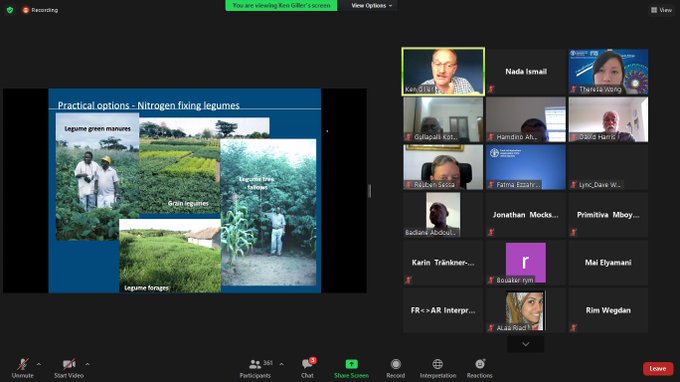10 May 2021. Regenerative Agriculture vs. Agroecology: nomenclature hype or principle divergence?(a) A decade of CSA: what are the achievements, the challenges and the bottlenecks? (b) What practical implications for smallholder farmers, agriculture and the environment?
- Ismahane Elouafi Chief Scientist – Food and Agriculture Organization of the United Nations.
"Sustainability and resilience of agri-food systems hang in a balance and are increasingly a matter of survival."- Ken Giller Professor of Plant Production Systems – Wageningen University & Research.
"Gene-editing and other approaches to genetic modification are central to exploiting biological resistance to reduce the need for insecticides and fungicides - so a key tool for agroecology"
- Professor Jacques Wery – ICARDA
- Bruce Campbell - Director of the CGIAR Research Program on Climate Change, Agriculture and Food Security (CCAFS).
- Jean-Marc Faurès - Regional Programme Leader - Food and Agriculture Organization of the United Nations Regional Offce for the Near East and North Africa.
- Theresa Wong - Natural Resources Offcer - Food and Agriculture Organization of the United Nations Regional Offce for the Near East and North Africa.
- Melle Leenstra - Agricultural Counsellor to Egypt & Jordan – Ministry of Agriculture, Nature and Food Quality.
- Reuben Sessa - Programme Officer (Climate Change) SP2 Management Team – Food and Agriculture Organization of the United Nations.
Resources:Ken E Giller , Renske Hijbeek , Jens A Andersson and James Sumberg (2021) Regenerative Agriculture: An agronomic perspective March 2021, 13 ppRegenerative Agriculture has been promoted strongly by civil society and NGOs as well as by many of the major multi-national food companies. Many practices promoted as regenerative, including crop residue retention, cover cropping and reduced tillage are central to the canon of ‘good agricultural practices’, while others are contested and at best niche (e.g. permaculture, holistic grazing). Worryingly, these practices are generally promoted with little regard to context. Practices most often encouraged (such as no tillage, no pesticides or no external nutrient inputs) are unlikely to lead to the benefits claimed in all places. We argue that the resurgence of interest in Regenerative Agriculture represents a re-framing of what have been considered to be two contrasting approaches to agricultural futures, namely agroecology and sustainable intensification, under the same banner. This is more likely to confuse than to clarify the public debate. More importantly, it draws attention away from more fundamental challenges. We conclude by providing guidance for research agronomists who want to engage with Regenerative Agriculture.Leslie Lipper (IFAD) Philip K Thornton (CGIAR) Bruce Morgan Campbell (CCAFS) Tobias Baedeker (WB) Climate-smart agriculture for food security, November 2014Climate-smart agriculture (CSA) promotes coordinated actions by farmers, researchers, private sector, civil society and policymakers towards climate-resilient pathways through four main action areas: (1) building evidence; (2) increasing local institutional effectiveness; (3) fostering coherence between climate and agricultural policies; and (4) linking climate and agricultural financing. CSA differs from 'business-as-usual' approaches by emphasizing the capacity to implement flexible, context-specific solutions, supported by innovative policy and financing actions.GACSA is an inclusive, voluntary and action-oriented multi-stakeholder platform on Climate-Smart Agriculture (CSA).GACSA aims to catalyze and help create transformational partnerships to encourage actions that reflect an integrated approach to the three pillars of CSA: food security, nutrition and resilience.FAO (2019) Tool for Agroecology Performance Evaluation (TAPE).– Process of development and guidelines for application. Test version. Rome. 94 pp.
- GACSA's Knowledge Action Group has developed 12 practice and policy briefs.
- Upscaling Climate Smart Agriculture adoption in Africa (2020, 4 pp.) - Read the policy brief focusing on Upscaling Climate Smart Agriculture adoption in Africa, to which GACSA contributed to during the Biennial Africa Climate Smart Agriculture Stakeholders Conference in 2020.
Based on various existing assessment frameworks, TAPE is a comprehensive tool that aims to measure the multi-dimensional performance of agroecological systems across the different dimensions of sustainability. It applies a stepwise approach at the household/farm level but it also collects information and provides results at a community and territorial scale. The tool was designed to remain simple and to require minimum training and data collection.



No comments:
Post a Comment